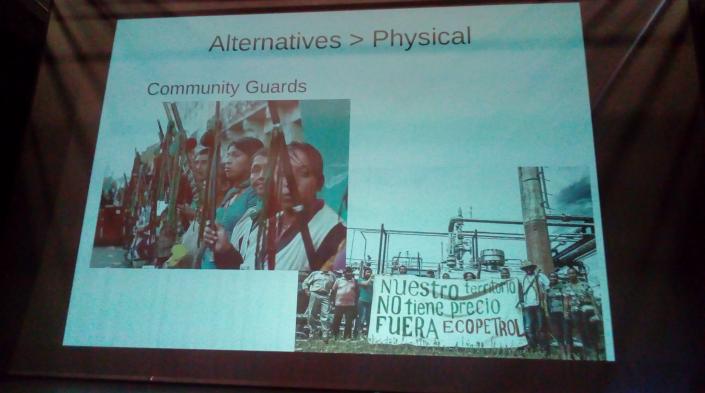
Published on
Page last updated on
Among human rights defenders (HRDs), those working on land, indigenous peoples’ and environmental rights are the most targeted group. Over 200 environmental HRDs were killed in 2017 alone, 60% of them in Latin America.
This situation was the motivation behind the session “Collective digital security strategies for environmental HRDs” at this year’s Internet Freedom Festival in Valencia, Spain. The session was aimed at better understanding the risks and needs of this population, and sharing collective digital security strategies that have been used by rural communities and environmental HRDs to mitigate the risks they face.
Led by Ariel Barbosa from Colombia-based APC member Colnodo and Moritz Tenthoff from Broederlijk Delen, the session addressed the digital surveillance threats posed by extractive industries and the strategies deployed to target environmental HRDs and community guards. The industries driving the attacks are mostly from the agribusiness sector and mining and other extractive companies, and perpetrators are often the military and the police, which means state violence against people protecting their territory. Abuses of power include hate speech, delegitimising and criminalising social protest, flexibilisation of legal frameworks on environmental issues, and agreements between extractive companies and defence ministries.
Private electronic surveillance networks are being deployed throughout the Latin American region, including Colombia, which was featured in the session. “There are suspicions of the use of drones during protests, phone interceptions, theft of devices, but more evidence, more research is needed,” stressed Barbosa. “To what extent are private companies using technology to spy on social struggles?”
Holistic security as a strategy was shared by Tenthoff. This entails working at the individual and collective/organisational/community levels, all intertwined with the territorial level. It involves physical strategies such as the use of community guards (unarmed people, mostly women with sticks, facing the military), and psycho-social support, as well as digital security strategies.
With regard to Colnodo’s work training communities on digital security in Colombia, Barbosa mentioned the obstacles involved in working in rural areas that still have limited infrastructure, and where HRDs face huge risks and threats. He stressed the importance of building community networks to overcome these obstacles, and presented the initiative in Cauca, Colombia, where local communities planned and developed their own communications network, with support from the Internet Society, Colnodo, and fellow APC member organisation Rhizomatica.
About the IFF
The Internet Freedom Festival (IFF) held in Valencia, Spain on a yearly basis has become one of the main events for civil society on internet rights, with a special focus on surveillance, censorship and circumvention worldwide. The 2019 IFF marks an important milestone, as it is celebrating its fifth anniversary, with occasions for celebration and reflection.
The Festival can be followed remotely through the #InternetFF hashtag and by following @InternetFF. At APC, we'll be sharing live updates on @apc_news and @takebackthetech.


